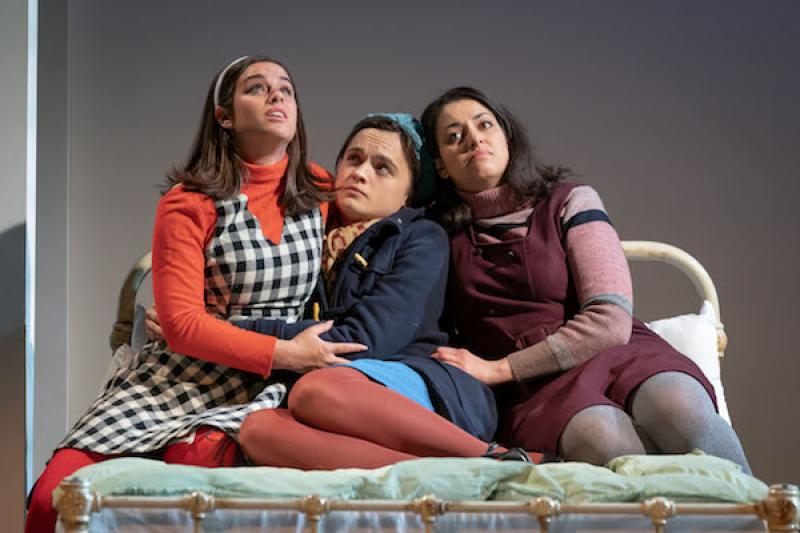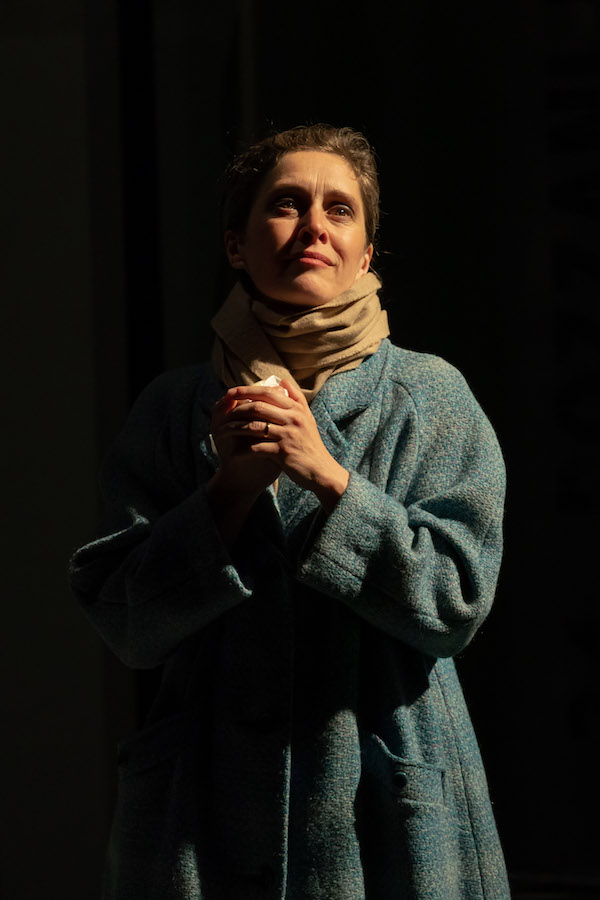Napoli, Brooklyn, Park Theatre review - lacking substance | reviews, news & interviews
Napoli, Brooklyn, Park Theatre review - lacking substance
Napoli, Brooklyn, Park Theatre review - lacking substance
Actors battle with accents and a wooden script in 1960s drama set in a New York Italian immigrant neighbourhood

According to their mother, Luda (played by Madeleine Worrall, pictured below), each of the three sisters (pictured top) in Napoli, Brooklyn, bears one of their father’s admirable traits. Tina (Mona Goodwin), the oldest, who left school early to earn money for the family in a factory job, has his strength.
Meghan Kennedy’s play, set in the 1960s, opens in a cramped Brooklyn apartment with a few quick disclosures. Nic is violent towards his wife and daughters. As a first-generation Italian immigrant to New York he feels belittled by his new country, spending his days spreading tarmac while in Naples he “could have been a prince”. He’s also convinced that in Italy he would have had sons, which he would have preferred. Luda is long-suffering, and has both infinite patience and a masochistic streak that allows her to seek out and relish the pain Nic metes out. She seems on the cusp of an affair with the butcher, Albert (Stephan Hogan), in part in retaliation for Nic’s own infidelities. Francesca is in love with her best friend Connie (Laurie Ogden) and together they plan to stow away on a ship to Paris. Vita is stewing and Tina is friendless.
 Each is stuck and, consciously or unconsciously, searching for a different kind of life. The reasons they are searching are marked out early – due to different attitudes towards gender, race, sexuality, immigration, aspiration, religion and social station. Playbook problems, fine. But deft writing can tackle even an abundance of such fault lines. Unfortunately, Kennedy’s script prioritises external, circumstantial changes over internal, emotional shifts: Tina's bitterness about being the left-out illiterate daughter is largely unexamined and Connie's conflicted feelings about her Catholicism and lesbianism are mentioned but hardly plumbed. The action feels to a large extent hollow, with characters seeming more like wind-up toys than human beings quivering in the face of dramatic dilemmas.
Each is stuck and, consciously or unconsciously, searching for a different kind of life. The reasons they are searching are marked out early – due to different attitudes towards gender, race, sexuality, immigration, aspiration, religion and social station. Playbook problems, fine. But deft writing can tackle even an abundance of such fault lines. Unfortunately, Kennedy’s script prioritises external, circumstantial changes over internal, emotional shifts: Tina's bitterness about being the left-out illiterate daughter is largely unexamined and Connie's conflicted feelings about her Catholicism and lesbianism are mentioned but hardly plumbed. The action feels to a large extent hollow, with characters seeming more like wind-up toys than human beings quivering in the face of dramatic dilemmas.
It’s difficult to breathe life into wooden characters, so Worrall’s performance as Luda is notable. As Luda holds the household together, so Worrall holds the cast. She plays with just the right level of camp to ham up the absurdity of a woman who makes herself cry with onions without compromising on her humanity. Her threat to her tongue-smart daughter Vita ("You see this table? You were BORN on this table... We almost CALLED you Table. Tavola!") raises a laugh and when her own reckoning comes, she seems genuinely touched. Another moment beautifully played is between Albert and Celia (Gloria Onitiri), both of whom have been hit by tragedy. It’s striking for being one of the few moments where characters talk to each other rather than at each other. Dropping the declarative mode which characterises so much of the play is a real improvement. Dropping words altogether (such as when Nic dances with Luda and then Vita, whose face still bears the marks of his assault) is too.
Set design is mundane and for a rich urban landscape, sound effects are remarkably thin. Accents (Italian, Irish, American) across the board are questionable, though settle half-way through the first half into semi-passable pastiches. There’s no doubting the play’s ambitions and good-nature, but neither make up for the lack of dramatic tension. Multiple scenes feature food – spaghetti, onions and raw meat – and they might well be the most real things on stage.
- Napoli, Brooklyn is at the Park Theatre until July 13
- Read more theatre reviews on theartsdesk
rating
Share this article
The future of Arts Journalism
You can stop theartsdesk.com closing!
We urgently need financing to survive. Our fundraising drive has thus far raised £49,000 but we need to reach £100,000 or we will be forced to close. Please contribute here: https://gofund.me/c3f6033d
And if you can forward this information to anyone who might assist, we’d be grateful.

Subscribe to theartsdesk.com
Thank you for continuing to read our work on theartsdesk.com. For unlimited access to every article in its entirety, including our archive of more than 15,000 pieces, we're asking for £5 per month or £40 per year. We feel it's a very good deal, and hope you do too.
To take a subscription now simply click here.
And if you're looking for that extra gift for a friend or family member, why not treat them to a theartsdesk.com gift subscription?
more Theatre
 Troilus and Cressida, Globe Theatre review - a 'problem play' with added problems
Raucous and carnivalesque, but also ugly and incomprehensible
Troilus and Cressida, Globe Theatre review - a 'problem play' with added problems
Raucous and carnivalesque, but also ugly and incomprehensible
 Clarkston, Trafalgar Theatre review - two lads on a road to nowhere
Netflix star, Joe Locke, is the selling point of a production that needs one
Clarkston, Trafalgar Theatre review - two lads on a road to nowhere
Netflix star, Joe Locke, is the selling point of a production that needs one
 Ghost Stories, Peacock Theatre review - spirited staging but short on scares
Impressive spectacle saves an ageing show in an unsuitable venue
Ghost Stories, Peacock Theatre review - spirited staging but short on scares
Impressive spectacle saves an ageing show in an unsuitable venue
 Hamlet, National Theatre review - turning tragedy to comedy is no joke
Hiran Abeyeskera’s childlike prince falls flat in a mixed production
Hamlet, National Theatre review - turning tragedy to comedy is no joke
Hiran Abeyeskera’s childlike prince falls flat in a mixed production
 Rohtko, Barbican review - postmodern meditation on fake and authentic art is less than the sum of its parts
Łukasz Twarkowski's production dazzles without illuminating
Rohtko, Barbican review - postmodern meditation on fake and authentic art is less than the sum of its parts
Łukasz Twarkowski's production dazzles without illuminating
 Lee, Park Theatre review - Lee Krasner looks back on her life as an artist
Informative and interesting, the play's format limits its potential
Lee, Park Theatre review - Lee Krasner looks back on her life as an artist
Informative and interesting, the play's format limits its potential
 Measure for Measure, RSC, Stratford review - 'problem play' has no problem with relevance
Shakespeare, in this adaptation, is at his most perceptive
Measure for Measure, RSC, Stratford review - 'problem play' has no problem with relevance
Shakespeare, in this adaptation, is at his most perceptive
 The Importance of Being Earnest, Noël Coward Theatre review - dazzling and delightful queer fest
West End transfer of National Theatre hit stars Stephen Fry and Olly Alexander
The Importance of Being Earnest, Noël Coward Theatre review - dazzling and delightful queer fest
West End transfer of National Theatre hit stars Stephen Fry and Olly Alexander
 Get Down Tonight, Charing Cross Theatre review - glitz and hits from the 70s
If you love the songs of KC and the Sunshine Band, Please Do Go!
Get Down Tonight, Charing Cross Theatre review - glitz and hits from the 70s
If you love the songs of KC and the Sunshine Band, Please Do Go!
 Punch, Apollo Theatre review - powerful play about the strength of redemption
James Graham's play transfixes the audience at every stage
Punch, Apollo Theatre review - powerful play about the strength of redemption
James Graham's play transfixes the audience at every stage
 The Billionaire Inside Your Head, Hampstead Theatre review - a map of a man with OCD
Will Lord's promising debut burdens a fine cast with too much dialogue
The Billionaire Inside Your Head, Hampstead Theatre review - a map of a man with OCD
Will Lord's promising debut burdens a fine cast with too much dialogue

Add comment